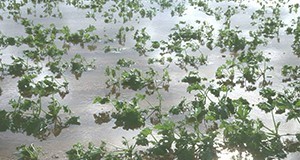Abstract
Flooding is a major risk for commercial vegetable production in south Florida, especially in the south Dade County area. Flooding causes oxygen deficiency, or hypoxic stress, causing the plants to produce less energy. This shortage in energy prevents the absorption of nutrients like nitrogen, phosphorous, and potassium. This revised 4-page fact sheet discusses several different management practices for overcoming flood damage, including the use of nitrogen and potassium fertilizers, oxygen fertilizers, growth regulators, and fungicides. Written by Goudong Liu, Yuncong Li, and Xiangju Fu, and published by the Soil and Water Science Department, December 2015.
SL 206/SS425: Practices to Minimize Flooding Damage to Commercial Vegetable Production (ufl.edu)
References
Liu, G.D., Y.C. Li, K. Migliaccio, T. Olczyk, and A. Alva. 2013. "Oxygen Amendment on Growth and Nitrogen Use Efficiency of Flooded Italian Basil." International Journal of Vegetable Science 19: 217-227. Available online at http://hos.ufl.edu/sites/default/files/faculty/gdliu/O2Basil.pdf https://doi.org/10.1080/19315260.2012.713451
Martinelle, K and L. Häggström . 1993. "Mechanisms of ammonia and ammonium ion toxicity in animal cells: transport across cell membranes." Journal of Biotechnology. 30(3):339-50. https://doi.org/10.1016/0168-1656(93)90148-G
Mattson, N. 2011. Ammonium Toxicity: Avoid getting burned this winter. Culture Notes. Cornell University Growertalks, October 2011. Available online at http://www.greenhouse.cornell.edu/crops/factsheets/AmmoniumToxicity.pdf
Scott, H.D. and F.G. Renaud. 2007. Aeration and Drainage. In: Irrigation of agricultural crops (2nd ed) (eds) R.J. Lascano and R.E. Sojka. 195-235. ASA-CSA-SSSA, Inc. Madison, WI. https://doi.org/10.2134/agronmonogr30.2ed.c7

